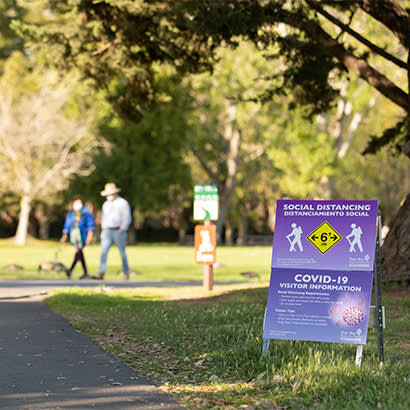
For an enhanced digital experience, read this story in the ezine.
East Bay Regional Park District (EBRPD) in Oakland, California, manages a system of 73 parks, 1,300 miles of trails and 55 miles of shoreline on 125,000 acres in the East San Francisco Bay Area. We are proud to serve the very diverse East Bay population, especially in these difficult times, by keeping 99 percent of our parks open and accessible, allowing all people access to the vital mental and physical benefits of exercising in nature.
Well before the current coronavirus (COVID-19) health crisis, EBRPD established significant programming, encouraging greater access by members of under-resourced communities. In partnership with our Regional Parks Foundation, we implemented a robust Healthy Parks Healthy People program, fostering relationships with doctors and hospitals to develop scientific studies showing the health merits of access to nature. A Parks Rx program and increasingly well-attended multicultural wellness walks followed. However, more work needs to be done to address the systemic health disparities that impact many of the communities we serve.
Assisting Public Health Agencies
Unsurprisingly, local health agencies declared outdoor activity as essential activity at the onset of the Bay Area shelter-in-place (SIP) order. An immediate surge of users followed, as parks were the only game in town for getting out of the house to exercise. EBRPD responded quickly — balancing the needs to safely keep parks open and protect staff. Within 24 hours of California’s first-in-the-nation statewide SIP order, EBRPD began producing public service announcements describing how to keep safe in the parks during the pandemic. We kept most parks open, but temporarily closed some parking lots to reduce crowding, closed high-touch facilities — such as restrooms, play structures and picnic tables — and halted trash pickup.
County health agencies subsequently asked EBRPD to keep parks and trails open as an essential service during the pandemic and the SIP orders. Weekly discussions with the county health agencies followed, and safety protocols were developed to keep staff safe when cleaning restrooms and picking up trash. Many of the closed amenities were reopened within two weeks. East Bay Parks staff rose to the challenge of creating signage and educating both regular park users and thousands of new visitors on maintaining physical distancing and wearing masks. At the same time, staff developed a reopening plan to ensure equitable park access to both urban and rural parks and trails, keeping as many parks as possible open for all, and rejecting calls from wealthy neighborhoods to restrict access to locales. Ninety-nine percent of our parks and trails have stayed open, and we continue to reopen those few closed facilities as safely allowable.
Advocating for Equity
Equitable public access has long been a focus of the agency. Forty years ago, at the urging of conservation and community leaders, we made a huge commitment to provide public access along the urban shoreline, adjacent to some of the historically most under-resourced communities in East Bay. Miller/Knox Regional Shoreline in Richmond was our first shoreline park, followed by Martin Luther King Jr. Shoreline in Oakland and Point Pinole Regional Shoreline in Richmond, which recently received a major upgrade with a restoration and public access project. During the past 10 years, EBRPD has invested nearly $100 million in these urban communities and others, providing both more access and new park improvements. We know the need is great and continue to keep our commitment to do more for social and environmental justice, especially now. This year, with grants and assistance largely supported by our legislative delegation, we’re opening three shoreline projects:
- Bay Point Regional Shoreline Restoration and Access Project – $5.8 million ($3.9 grant funded, including $750,000 from a Land and Water Conservation Fund [LWCF] competitive grant)
- McLaughlin Eastshore State Park Albany Beach Restoration and Bay Trail – a connection between the West Berkeley and Albany communities – $14 million ($4.6 million grant funded)
- Judge John Sutter Regional Shoreline in West Oakland – new waterfront park with a public access pier – $29.6 million (funded and developed by Caltrans and MTC/Bay Area Toll Authority)
EBRPD has and will persist in making the case with our legislators for the need of continued enhanced investment in our vital public access programs and projects that deliver access to nature for all. As the economy cratered under the weight of SIP orders, EBRPD set up meetings with state and local legislators to remind them that parks truly are an essential service and that the surge in visitation is real.
In the short term, we need to protect the funding we have and proactively seek recovery funds as we navigate the uncertain times ahead. A future green stimulus and/or funding of LWCF could help fix and maintain parks, increase equitable access and continue parks’ role as part of the health system while providing needed economic opportunities for those struggling financially, even while mitigating some of the effects of climate change. In the long term, learning from this moment and keeping the public’s trust will position park agencies well for future funding.
EBRPD has found that social media, Zoom meetings, virtual walk-and-talks and written correspondence are all effective ways to communicate at a time when elected officials are seeking positive stories. The park and recreation field has a great story to tell right now, so let’s tell it together!
Robert Doyle is General Manager at East Bay Regional Park District.

